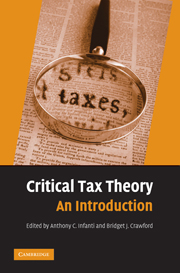Book contents
- Frontmatter
- Contents
- List of Illustrations
- List of Tables
- List of Contributors
- List of Common Abbreviations
- Introduction
- CHAPTER 1 FOUNDATIONS OF CRITICAL TAX THEORY
- CHAPTER 2 HISTORICAL PERSPECTIVES ON TAXATION
- CHAPTER 3 THE GOALS OF TAX POLICY
- CHAPTER 4 CRITICAL TAX THEORY MEETS PRACTICE
- CHAPTER 5 RACE AND TAXATION
- CHAPTER 6 GENDER AND TAXATION
- CHAPTER 7 SEXUAL ORIENTATION AND TAXATION
- CHAPTER 8 THE FAMILY AND TAXATION
- CHAPTER 9 CLASS AND TAXATION
- CHAPTER 10 DISABILITY AND TAXATION
- CHAPTER 11 GLOBAL CRITICAL PERSPECTIVES ON TAXATION
- CHAPTER 12 CRITICAL PERSPECTIVES ON CRITICAL TAX THEORY
- Index
CHAPTER 9 - CLASS AND TAXATION
Published online by Cambridge University Press: 04 August 2010
- Frontmatter
- Contents
- List of Illustrations
- List of Tables
- List of Contributors
- List of Common Abbreviations
- Introduction
- CHAPTER 1 FOUNDATIONS OF CRITICAL TAX THEORY
- CHAPTER 2 HISTORICAL PERSPECTIVES ON TAXATION
- CHAPTER 3 THE GOALS OF TAX POLICY
- CHAPTER 4 CRITICAL TAX THEORY MEETS PRACTICE
- CHAPTER 5 RACE AND TAXATION
- CHAPTER 6 GENDER AND TAXATION
- CHAPTER 7 SEXUAL ORIENTATION AND TAXATION
- CHAPTER 8 THE FAMILY AND TAXATION
- CHAPTER 9 CLASS AND TAXATION
- CHAPTER 10 DISABILITY AND TAXATION
- CHAPTER 11 GLOBAL CRITICAL PERSPECTIVES ON TAXATION
- CHAPTER 12 CRITICAL PERSPECTIVES ON CRITICAL TAX THEORY
- Index
Summary
“As a whole, the tax field tends to emphasize the rich rather than the poor,” observes Michael Livingston in Women, Poverty, and the Tax Code: A Tale of Theory and Practice. Three of the authors in this chapter – Livingston, Francine Lipman, and Dennis Ventry – invert the traditional emphasis of tax scholars to explore how the Code addresses, or fails to address, poverty. Livingston calls for a dialogue between academics and politicians on the intersection of gender and poverty. In The Working Poor Are Paying for Government Benefits: Fixing the Hole in the AntiPoverty Purse, Lipman exposes professional tax preparers as the disproportionate beneficiaries of the EITC program, which is designed to assist the working poor. She offers solutions that would reduce the significant costs, presently borne by poor taxpayers, for demonstrating eligibility for the EITC. Dennis Ventry, in Welfare by Any Other Name: Tax Transfers and the EITC, evaluates the general effectiveness of the EITC program. Despite its efficiencies, Ventry raises concerns about relying on the Code to function as the country's main anti-poverty program.
Wilton B. Hyman's article, Race, Class, and the Internal Revenue Code: A Class-Based Analysis of A Black Critique of the Internal Revenue Code, makes the case for taking a more nuanced approach to the categories of “wealth,” “poverty,” and “race.”
- Type
- Chapter
- Information
- Critical Tax TheoryAn Introduction, pp. 269Publisher: Cambridge University PressPrint publication year: 2009



